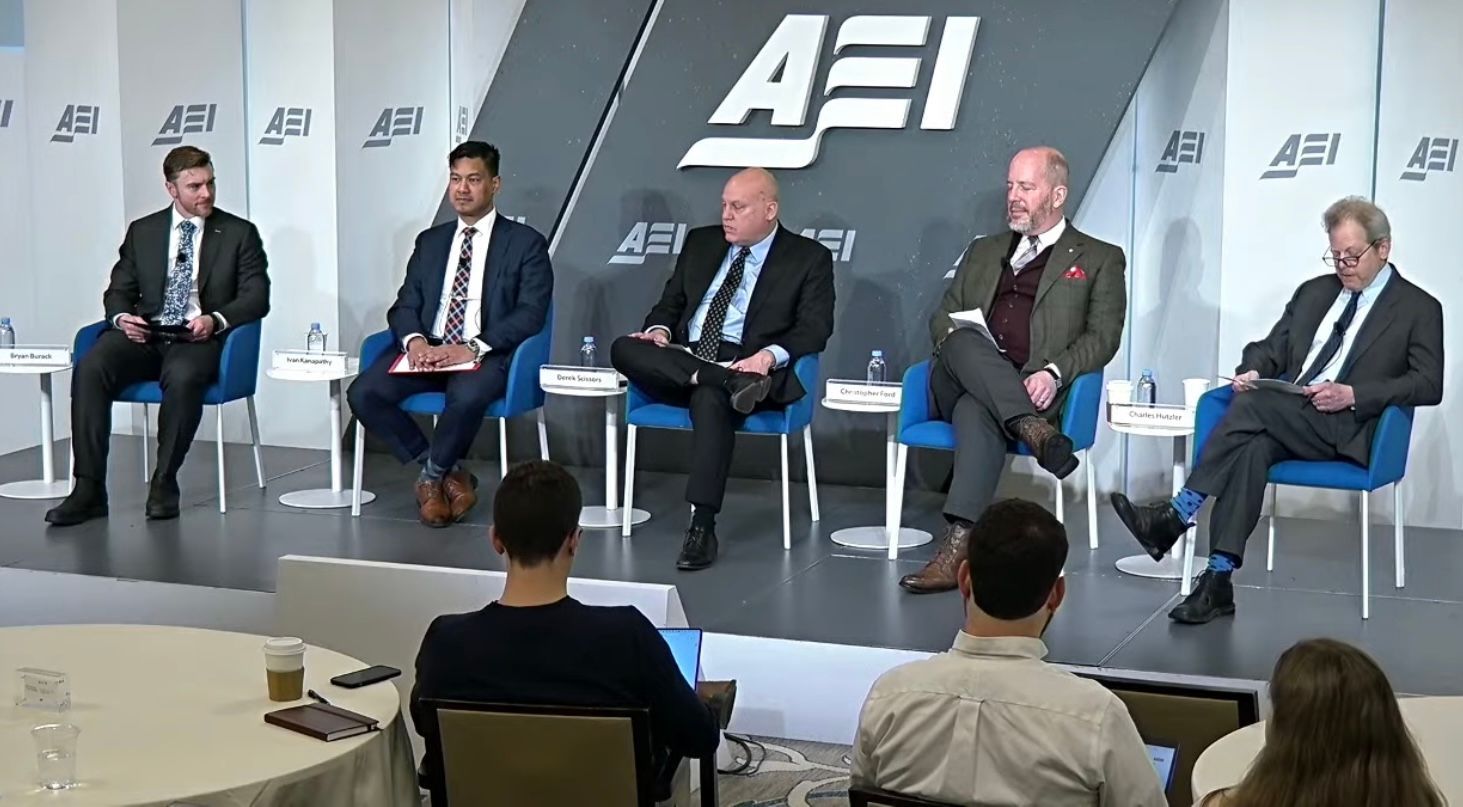The Hon. Christopher A. Ford
New Paradigms Forum -- International Security Policy Since 2009
Diplomatic Challenges for the U.S. Nuclear Posture Review
Note:
This is the written version of remarks Christopher Ford gave to a workshop in Washington, D.C. on October 21, 2009, sponsored by the Los Alamos National Laboratory and the Woodrow Wilson International Center for Scholars .
It’s a pleasure to be here again. I am grateful to the Los Alamos National Laboratory, and of course our gracious hosts here at the Wilson Center, for all their efforts in putting together this workshop.
I should start, of course, by noting that until the pending U.S. Nuclear Posture Review (NPR) is actually finished, one can’t say much about its impact upon multilateral diplomacy and the global nonproliferation regime. Nevertheless, I think it is still possible to make some overarching observations about the kind of dynamics we might reasonably expect to see.
I. Past NPRs and Their Reception
To get some perspective on how the Obama NPR may be received by the international community of diplomats specializing in arms control, nonproliferation, and disarmament – which for convenience I’ll just call the “diplomatic community” here – it is useful to start by recalling the two previous Nuclear Posture Reviews, and how they were received.
President Bill Clinton’s 1994 NPR was greeted rather coldly in the diplomatic community – which had wanted and expected to see much greater, more disarmament-friendly changes in the first such review undertaken by U.S. officials after the end of the Cold War. Even before the NPR, of course, great reductions were by then already well underway in the United States and in the Former Soviet Union. Nevertheless, the Cold War was just over, and things were not then felt to be geopolitically stable enough to make U.S. strategic planners comfortable abandoning traditional force structures and approaches to deterrence.
While emphasizing the importance of continuing arms reductions, the Clinton NPR thus not also noted that “there is still great uncertainty about the future, particularly in the New Independent States where the process of denuclearization and reduction is underway but by no means completed.” As a result, it declared that “[t]he United States must provide a hedge against this uncertainty.” This limited the degree to which sweeping revisions in the American approach to deterrence could then take place.
The Bush Administration NPR completed in late 2001 was also a great disappointment to the diplomatic community. In a sense, this was the first conceptually post-Cold War review. U.S. planners had now moved well beyond their old fixation upon the Soviet Union or Russia – still evident in the Clinton review’s worries about “incomplete” denuclearization and reductions in the Former Soviet Union – and felt that this bipolar nuclear relationship should no longer be the exclusive focus of American nuclear policy. U.S. nuclear reductions continued, and even accelerated as President Bush’s Moscow Treaty and stepped-up warhead dismantlement efforts were added to Strategic Arms Reduction Treaty (START) cuts first set in motion by his father.
The Bush NPR, however, also had to struggle with challenges of future uncertainty, and some of its answers proved quite unpopular in diplomatic circles. In particular, the Review reflected glimmers of concern with the potential development of post-bipolar deterrence relationships among multiple players – noting, for instance, that Russia was not the only country capable of destroying the United States with nuclear weapons. The review also emphasized emerging nuclear proliferation threats.
As with the Clinton NPR, the Bush review emphasized the objective of maintaining and enhancing U.S. military flexibility in the face of continuing uncertainties. It did so, however, in a very different way. It outlined a “New Triad” consisting of offensive strike systems – including elements of the old strategic nuclear triad, but also new and evolving non-nuclear capabilities – defensive systems, and a responsive defense infrastructure. The 2001 NPR also committed the United States to an explicit policy of restructuring its remaining deterrent in order better to tailor it to contemporary threats. This became the locus of much controversy, for it contravened the well-established conventional wisdom of the diplomatic community.
Rather than maintain a Cold War-era force posture simply at lower numbers as President Clinton had done, the Bush NPR proposed, to some extent, to change the basic structure of the United States’ nuclear arsenal. For one, the review committed the United States to rely upon nuclear weapons less and less, with officials seeking to develop improved ways of accomplishing – with non-nuclear capabilities – missions that previously could have been undertaken only with nuclear weapons.
Because such improved non-nuclear capabilities were not at that point able entirely to replace reliance upon nuclear weapons, however, such weapons would be retained. The Bush Administration also accelerated warhead dismantlement, eating into its non-deployed reserves in anticipation of being able to “hedge” against future uncertainty through increasing reliance upon improved production capabilities rather than reserves of actual weapons.
Things got particularly controversial in arms control diplomacy, however, because with regard to the smaller number of nuclear weapons that would remain in existence, the NPR envisioned exploring new capabilities tailored to current threats – threats such as the danger of weapons of mass destruction stockpiles hidden in deeply-buried underground facilities. (This was the origin of official interest, for example, in the ill-fated and short-lived “bunker buster” nuclear weapons concept.) In theory, the logic ran, moving from a Cold War “legacy” posture to one engineered for current threats would strengthen U.S. security while also allowing numbers to be reduced to the bare minimum necessary to meet what strategic need for nuclear weapons still remained in the modern environment.
Where the Clinton NPR was viewed as a disappointment, elements of the Bush review were greeted with outrage. Criticisms of its approach – some accurate but some quite distorted – became a staple of diplomatic exchanges in the Nuclear Nonproliferation Treaty (NPT) Review Process and at the U.N. Conference on Disarmament (CD). In particular, the NPR’s speculation about new types of nuclear weapons, its suggestion of the potential utility of nuclear explosives against deeply-buried WMD targets, and its rejection of the strategic inflexibilities of the Anti-Ballistic Missile (ABM) Treaty and the Comprehensive Test Ban Treaty (CTBT) were greeted with howls of protest. These complaints were compounded in 2002, when the Bush Administration stated in print what had long been U.S. policy already: that it “reserves the right to the right to respond with overwhelming force – including through resort to all of our options – to the use of WMD against the United States, our forces abroad, and friends and allies.”
In diplomatic circles, unhappiness with these affronts to the arms control conventional wisdom drowned out all else. Despite the U.S. emphasis upon continued reductions, and the development of non-nuclear capabilities with which increasingly to replace nuclear weaponry in strategic deterrence, the word on the diplomatic street was simply that the 2001 NPR was a blueprint for nuclear warfighting and rearmament. It didn’t matter that this wasn’t true; the conclusion was accepted as a matter of faith, and significantly raised the temperature of debates in NPT fora and at the CD.
I. And What's Next?
Appreciating this history helps us understand some of the dynamics that will affect how President Barack Obama’s NPR is viewed.
(1) It’s All About America....
One lesson one can draw from the diplomatic debates surrounding the last two NPRs is that the details of America’s nuclear posture matter hugely to the diplomatic community, while the nuclear force postures or doctrines of other possessors apparently matter almost not at all. The United Kingdom, France, and Russia have all made it clear at various points that they still reserve the right to use nuclear weapons in response to attacks inflicted upon them with non-nuclear WMD. Russia actually emphasizes the importance of using nuclear weapons in response to conventional attacks; the head of its Presidential Security Council declared recently that Russia reserved the option of “preventative” nuclear strikes.
Despite China’s vaunted “no-first-use” policy, moreover, its officials and military writings have suggested that this policy is “conditional,” and that Beijing, too, reserves the right to use nuclear weaponry in response to conventional attacks. Since India, Pakistan, an North Korea – not to mention Israel, most presume – also seem to reserve the possibility of nuclear use in response to some kind of non-nuclear attack, it seems safe to say that every nuclear weapons possessor takes a position of this sort. All of them, in other words, appear to believe that nuclear weapons retain at least some utility in deterring non-nuclear attack. For years, however, it has been the United States which has alone borne the brunt of criticism in the diplomatic community for this heresy.
Similarly, while even feasibility studies of new U.S. nuclear weapon types – to wit, the so-called “bunker buster” concept or the “reliable replacement warhead” (RRW) program – have aroused firestorms of diplomatic controversy, one essentially never hears anyone complain about Russia’s development of what its officials say are new types of nuclear weapon and delivery systems. Nor does it seem to bother the diplomatic community, even in principle, that China is both modernizing its delivery systems and is today the only NPT nuclear weapons state to be increasing the size of its strategic nuclear arsenal. Indeed, the United States is today the only nuclear weapons possessor – either within the NPT or outside it – that isn’t modernizing at least its delivery systems in some fashion. Yet it is our posture and doctrine that has been the focus of sustained attention and criticism.
It is the same story with regard to nuclear testing. Worried about potential issues of technological reliability in Cold War-era warheads never designed to go indefinitely without testing, the Bush Administration moved to increase strategic flexibility by reducing the time needed to return to underground testing if needed. This was greeted by more cries of outrage from the diplomatic community. Recent revelations about “apparent” Russian low-yield nuclear testing and “possible” testing by China, however – appearing in a Congressional commission report declassified by the Obama Administration, in fact – seem to have elicited no diplomatic reaction whatsoever.
All in all, the lesson is clear: what matters to the diplomatic community is the nuclear policy of the United States – and the United States alone. This is where peril lies for the Obama review. What other countries are doing with their own nuclear forces may be irrelevant to diplomatic critics of American nuclear policy, but it cannot be irrelevant to the U.S. officials charged with preparing the Nuclear Posture Review. These official care a great deal about what other countries are doing.
We have already seen Russian and Chinese strategic modernization constrain the Obama Administration’s willingness to undertake arms reductions. Just before President Obama’s inauguration, Defense Secretary Robert Gates announced that in light of ongoing Russian and Chinese modernization efforts, it would make him “pretty nervous” for to go “below 1,500” deployed strategic warheads. Sure enough, when Presidents Obama and Medvedev reached their July 2009 agreement upon post-START numbers, the bottom end of the range for deployed warheads was indeed 1,500.
Today, foreign nuclear modernization remains largely ignored by the diplomatic community, but it continues just the same. As a result, there is much scope for further divergence between international disarmament priorities and U.S. strategic interests as time goes by.
(2) Nuclear Weapons “Legitimacy”
The diplomatic community concerned with arms control, nonproliferation, and disarmament matters places great stock in seeking to demonstrate that nuclear weapons are illegitimate and without any real military utility. In this regard, U.S. – and, if one presses hard enough, other nuclear weapons state – policies are often said to be important to the success of nonproliferation. If the “official” NPT-authorized possessors can show that they do not value such weaponry, the logic goes, other states will not be inclined to develop such tools.
For myself, I think this argument is extremely weak, and doubt that the value America attaches to its own nuclear weapons matters one whit to decision-makers in countries such as North Korea and Iran who seek nuclear weapons in part in order to immunize themselves against the possibility of ever having to pay any military price for regional provocations. (Such regimes don’t fear U.S. nuclear weapons; they fear U.S. conventional weapons.) All the same, the “legitimacy” argument is tenacious, and is repeated so often in some circles that an outsider might be forgiven for assuming it to be true.
In this context, the Obama Administration’s NPR presents potential problems. There is essentially no chance, I would think, that the current review will embrace nuclear weapons abolition on any near-term or even clearly foreseeable timetable. If the President’s pronouncements to date are any guide, in fact, the NPR will declare a need to retain some nuclear weapons for a long time in order to “deter any adversary.” President Obama has said that abolition may not occur in his own lifetime, and he is a young president.
This should be no surprise to anyone, but it necessarily implies that the United States continues to believe that nuclear weapons are both legitimate and – for now, at least – useful. The President may have been able to avoid paying a diplomatic price for this so far, by taking advantage of the audacity of others’ hopes that he will grant their fondest disarmament wishes. This ice, however, is thin; such escape will be much more difficult when his NPR actually articulates a U.S. nuclear deterrent policy that will inevitably remain to some degree offensive to those who believe it illegitimate to reply upon nuclear weapons at all.
(3) Force Posture Tailoring
How the Obama Administration deals with the issue of force posture tailoring is another variable that will condition the diplomatic community’s reaction to the current NPR – at least if the review is serious about charting a course toward the achievement of very low numbers. How low can we go, for instance, before maintaining our strategic “Triad” in its current form will become economically and programmatically unfeasible? The British and French no longer even pretend to maintain their own “Triads;” their low numbers made this unsustainable. (With Prime Minister Gordon Brown having recently announced his intention to reduce the number of Britain’s missile submarines from four to three, moreover, some wonder whether it will be possible for London to maintain continuous at-sea deterrent patrols.) At what point do we face questions about restructuring our shrinking force? And if we do, how confident are we that we will never need any new types of warhead or delivery system?
As George W. Bush discovered, however, the problem here is that the ideological and symbolic politics of international disarmament debates have thus far shown no tolerance for anything – at least from us, at any rate – that sounds like wanting “new” nuclear systems of any sort. (This is true even if such novelty consists of taking steps, such as the RRW, that actually facilitate reductions.) This will make longer-term disarmament planning problematic, even for our Nobel laureate-in-chief.
It is conceivable that President Obama will yet conclude that – by a remarkable coincidence – the perfect force mix for a future world of low U.S. arsenal numbers just happens to be nothing more than a miniaturized and non-modernized version of our Cold War arsenal. It is not at all clear that this is the case, however, and in any event such a conclusion is hardly inevitable. If the Obama review contemplates our ever needing any system or warhead different from what we have today, the United States’ experience with past NPRs suggests that diplomatic storms lurk on the horizon.
(4) Non-Nuclear Strategic Capabilities
As noted, as part of its effort to reduce U.S. reliance upon nuclear weapons, the Bush Administration placed an increased emphasis upon the development of non-nuclear strategic capabilities. The Pentagon has been exploring a range of “prompt global strike” options, including the mounting of conventional warhead (or even non-explosive) payloads on submarine-launched ballistic missiles.
The diplomatic community does not seem to have focused much upon these issues. Where most parties have been noncommittal, however, Russia and China are clearly opposed – and the Russians quite vocally so – to this non-nuclear trend in U.S. force planning. The issue of non-nuclear power could prove problematic for the Obama NPR and our future trajectory towards the goal of abolition. Possession of sophisticated and effective power-projection capabilities has been critical to making Washington increasingly willing to contemplate the prospect of some eventual nuclear “zero.” To put it crudely, we do not today feel that we need nuclear weapons to the extent that we used to.
The very same conventional capabilities that are thus facilitating U.S. disarmament, however, are likely to impede disarmament progress elsewhere, because Russia and China look askance at U.S. non-nuclear power projection already. America’s non-nuclear power makes other players worry more about their vulnerability in a world without nuclear weapons; this may tend to push them away from disarmament. Our conventional power also does little to make troublesome regional provocateurs such as Iran less interested in acquiring nuclear weapons. The last thing these various governments want is a world free of the nuclear weapons they feel are necessary to immunize themselves against our conventional might.
The only obvious answer to this conundrum that would allow such other countries to be more comfortable with disarmament is a “solution” that should be entirely unpalatable to the United States and presumably will not be advocated in the pending NPR: the wholesale abandonment of our power-projection capabilities and conception of global strategic interests. The future progress of disarmament, therefore, faces a Catch-22 situation: much of what makes us more willing to disarm makes others less so.
(5) Extended Deterrence
It also seems clear that the issue of U.S. “extended [nuclear] deterrence” will play an ever-larger role in arms control and disarmament debates as American arms reductions continue. For better or for worse, some countries clearly do rely for their security upon U.S. alliance guarantees underpinned in part by nuclear weapons. It has, in fact, become commonplace for experts to fret about the potential for nuclear weapons proliferation if our alliance guarantees are eroded by U.S. nuclear weapons reductions.
Significantly, we could see manifestations of these dynamics in diplomatic discourse long before anyone gets to the point of actually withdrawing from the NPT. Since the end of the Cold War, it has been easy for U.S. allies to have their political and rhetorical cake and eat it too – namely, by calling for nuclear disarmament and continuing to rely upon U.S. extended nuclear deterrence. Such convenient hypocrisy may become increasingly difficult to sustain over time, however. As the issue of extended deterrence comes increasingly “out of the closet,” we may see new twists in the world of disarmament and nonproliferation diplomacy.
Already, it has been reported, the Japanese government has balked at a proposal made, in a draft report by the International Commission on Nuclear Nonproliferation and Disarmament, that the United States should forswear the possibility of nuclear retaliation for any non-nuclear attacks. Japan’s representative voiced reservations because the proposal seemed to signal a weakening of the U.S. nuclear “umbrella” upon which Japan relies. This may be a sign of things to come.
Will the disarmament ardor of some U.S. allies cool as our arsenal numbers come down? Will their interest in building and maintaining strong nonproliferation norms wane, as they begin nervously to contemplate at least the possibility of having at some point to turn to nuclear weapons of their own? Does the Obama Administration have the stomach – or the money, in this new era of trillion-dollar deficits – for the kind of robust military alliance enhancement measures it might take to reassure allies of the U.S. security guarantee as we withdraw our nuclear “umbrella”? Many eyes will be watching how the Obama NPR handles the issue of both nuclear and non-nuclear alliance assurances in the years ahead.
(6) Nonproliferation “Payoff”?
(a) “Credibility”
It is frequently suggested, including by Obama Administration officials, that if only the United States finally shows “credibility” in its pursuit of disarmament, we will be able to energize much more effective international cooperation against nonproliferation. I call this the “credibility thesis.” But how likely is it that our disarmament policy will energize effective nonproliferation compliance enforcement?
The argument in favor of this thesis rests upon two premises. First, it assumes that the U.S. commitment to the ideal of disarmament has hitherto lacked credibility – but that our current president is fixing that problem. Second, it assumes that if this “credibility gap” were closed, it would be possible to meet today’s proliferation threats much more effectively and with a much wider base of diplomatic support. Both points are questionable.
Since the end of the Cold War, the United States has made nuclear arms reductions totaling perhaps 75 percent of our 1991 arsenal. This, however, was apparently not enough to demonstrate disarmament “credibility.” The Obama Administration has raised disarmament hopes to feverish heights, but what can the NPR realistically offer, in concrete terms, that will give more “credibility” than all that has been done already? It is hard to see how U.S. practice can live up to the soaring expectations that President Obama has taken such pains to create.
The diplomatic audience for disarmament measures lives in an ideologized world of disarmament iconography, fixated upon the symbolic impact of U.S. nuclear weapons policy and philosophically hostile to the very idea of nuclear force posture planning. Its members tend to reject nuclear deterrence in principle, and to dislike anything that does not demonstrate the illegitimacy and uselessness of nuclear weapons.
The current Nuclear Posture Review, however, will surely endorse at least some continuing role for nuclear weapons in U.S. strategy. As noted, President Obama has pledged to keep the elimination of nuclear weapons as his ultimate goal, but he has also said that this may not happen “in [his] lifetime” – and he has promised, until that point, to maintain a strong and secure nuclear force capable of deterring any adversary and protecting our allies through extended deterrence. Despite the President’s commitment to the CTBT, moreover, he will presumably also remain committed to maintaining a nuclear weapons production infrastructure – not only as a productive-capacity “hedge” against emergent geopolitical threats, but also in order to permit the maintenance of a reliable stockpile without testing.
These fundamentals – from which it is hard to imagine that even President Obama will depart – will not sit well with his currently enthusiastic admirers in the diplomatic community. They may still afford him some disarmament “credibility” on the strength of his promises about the ultimate destination and their fervent wishes for his success in this regard, but some falling to earth seems inevitable.
The “credibility thesis” presumes that the United States has never previously enjoyed real credibility on disarmament, including during the Clinton Administration. Except for his soaring disarmament speeches, however – and the fact that, thanks to reductions carried out by President George W. Bush, he presides over a U.S. arsenal notably smaller than it was when Bill Clinton left office – President Obama’s nuclear policies so far differ scarcely at all from those of the Clinton Administration.
To be sure, issues of purported “credibility” are ephemeral, political, and symbolic. It is still possible that, as with the Nobel Peace Prize, the rhetorical romance of Obama will continue to excuse the reality of his accomplishments. More likely, however, I suspect that he will find the pursuit of “credibility” a fickle master.
(b) Catalytic Nonproliferation?
But let us assume for the sake of argument that President Obama somehow acquires an absolute lock on disarmament “credibility.” Would this really catalyze a “payoff” in multilateral nonproliferation cooperation?
As noted earlier, the second prong of the credibility thesis assumes that if the disarmament credibility gap were finally closed, it would be possible to meet today’s proliferation threats much more effectively and with a wide base of diplomatic support. Since there is no evidence that nuclear weapons state possession is in any meaningful way a “driver” for the proliferation decisions of regimes such as North Korea and Iran, the usual argument in support of the credibility thesis is that third parties will become more willing to bear the burdens of vigorous nonproliferation policy if only we stop offending them by dragging our feet on disarmament. To my eye, this claim is not very plausible.
But does large-scale nuclear weapons possession in fact correlate historically with proliferation, and do arms reductions correlate to effective nonproliferation? No. The NPT was negotiated, opened for signature, and entered into force when the U.S. and Soviet nuclear arsenals were huge and their arms race was in full bloom. Furthermore, several countries abandoned nuclear weapons programs. Despite predictions, there was not a cascade of ubiquitous weaponization. Between the NPT’s entry into force and the end of the Cold War, only one country – India – joined the ranks of those openly possessing nuclear explosives.
But what happened after the end of the Cold War, when the number of weapons held by the two nuclear superpowers was reduced dramatically? To be sure, the transition out of the Cold War saw some resounding nonproliferation successes. Imminent regime change scuppered South Africa’s nuclear weapons program, and American bombs and international sanctions put paid to the one in Iraq. Ukraine, Belarus, and Kazakhstan were also cajoled into relinquishing the Soviet weapons that had been stranded on their soil.
When it comes to reining in weapons work undertaken in the post-Cold War era, however, the international community has been depressingly unsuccessful. With the exception of Libya, new challenges – in North Korea, India, Pakistan, Iran, and Syria – have emerged and accelerated during this period of U.S. and Russian reductions, and the world has found itself unable effectively to respond. What does this say about the link between disarmament and the international community’s willingness to bear burdens in support of nonproliferation?
President Obama’s disarmament rhetoric will surely increase the likelihood of a congenial consensus on some Final Document at the conclusion of the 2010 NPT Review Conference. This is a shallow standard for success, however, in the face of the threats facing the nonproliferation regime today. Quite apart merely from how satisfied the diplomats profess themselves to be in New York, is there any hope of real, substantive improvements – “on the ground,” as it were – in controlling or reversing the spread of nuclear weaponry?
We should probably not expect a significant nonproliferation “payoff” in return for our disarmament enthusiasm. Even if President Obama retains the disarmament community’s uncritical adulation, therefore – which is by no means assured, for at some point a real NPR will have to emerge from the mists onto which so many observers have projected their fondest hopes – he will probably still find it hard to elicit serious nonproliferation cooperation.
Many countries would surely seize upon a hawkish NPR as a further excuse to neglect nonproliferation, of course. This, however, would be just that: an excuse and rationalization, not a reason. Their reluctance is unfortunately already well documented. Sadly, however, it is not likely that a dovish NPR would elicit much additional nonproliferation seriousness, especially with regard to the challenges of compliance enforcement. The president’s promises may be repaid in kind, in other words, but I fear his actions will not be. Nonproliferation diplomacy is likely to become more congenial rather more rapidly than it becomes more productive.
-- Christopher Ford



Copyright Dr. Christopher Ford All Rights Reserved






